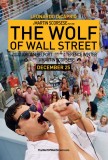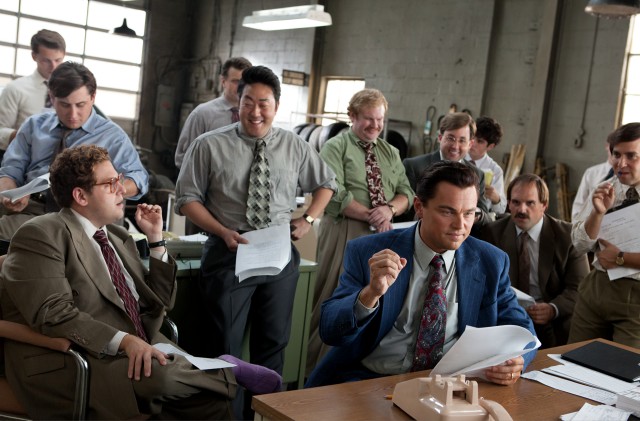The Wolf of Wall Street Movie Review

The Wolf of Wall Street is now available on home video. Read our review of the Blu-ray + DVD combo.
 |
The Wolf of Wall Street
Theatrical Release: December 25, 2013 / Running Time: 179 Minutes / Rating: R Director: Martin Scorsese / Writers: Terence Winter (screenplay), Jordan Belfort (book) Cast: Leonardo DiCaprio (Jordan Belfort), Jonah Hill (Donnie Azoff), Margot Robbie (Naomi), Matthew McConaughey (Mark Hanna), Kyle Chandler (Patrick Denham), Rob Reiner (Max Belfort), Jean Dujardin (Jean-Jacques Saurel), Jon Favreau (Manny Riskin), Cristin Milioti (Teresa Petrillo), Jon Bernthal (Brad), Kenneth Choi (Chester Ming), P.J. Byrne (Nicky "Rugrat" Koskoff), Joanna Lumley (Aunt Emma), Katarina Cas (Chantalle), Ethan Suplee (Toby Welch), Spike Jonze (Dwayne), Shea Whigham (Captain Ted Beecham), Jake Hoffman (Steve Madden), Stephanie Kurtzuba (Kimmie Belzer), Madison McKinley (Heidi), Christine Ebersole (Leah Belfort), Giselle Eisenberg (Skylar Belfort) |
Buy The Wolf of Wall Street from Amazon.com: Blu-ray + DVD + Digital Copy • DVD • Instant Video
The Wolf of Wall Street returns Martin Scorsese to crime drama, the genre that has most defined his long, distinguished filmmaking career. Though this time around it is the white collar variety, Wolf is based on the first of two memoirs by Jordan Belfort, a New Yorker who at a young age rose and fell on fraudulent stock trade practices. Belfort (Leonardo DiCaprio, of course) begins working on Wall Street in his early 20s in the late 1980s, hired to make as many cold calls as he can encouraging businesses to invest. Belfort immediately finds a mentor in Mark Hanna (Matthew McConaughey in a brief but influential appearance), who shows him the ropes not at work but at a fancy restaurant where he orders martinis to be delivered every seven minutes and snorts cocaine between arrivals. Hanna explains that they are not in the business to help clients but to help themselves by selling enough to keep commissions flowing.
On Belfort's first day as a trader, the market takes its biggest dive since the Great Depression and he is quickly out of work. He finds a new job via a classified ad at a dumpy business in a Long Island strip mall that sells penny stocks to desperate folks who respond to their ads in the back of Hustler. Belfort immediately discovers a knack for this work, stunning his new colleagues with the speed and confidence at which he can sell thousands of dollars' worth of garbage to strangers, taking a 50% commission on the trades.
Belfort takes his gift to his own company which he starts up with Donnie Azoff (Jonah Hill, sporting white dentures and trying to channel Joe Pesci), Belfort leaves his first wife (Cristin Milioti) for Naomi (Margot Robbie), a younger, sexier blonde whom he soon marries and names a newly-purchased giant yacht after. Prostitutes at three different rates are a significant part of Belfort's firm's sky high expenses. He's not faithful to his wife, even after she has his child. Belfort and company are heavy users of drugs, preferring Quaaludes, but supplementing them with copious amounts of cocaine.
Eventually, Belfort and his stately 7-acre mansion draw the attention of the SEC and of the FBI, whose assigned agent (a typically great Kyle Chandler) seems charmed and cooperative upon accepting an invitation to meet on Belfort's Naomi, until he confesses he's determined to bring the detestable, obscenely wealthy fraud down.
Over the years, Scorsese's films have given us an assortment of antiheroes, including gangsters, murderers, and sociopaths. In Jordan Belfort, though, he might have uncovered his least sympathetic protagonist yet. Belfort's large, lavish lifestyle and unflagging spirit are seductive, but his shameless thievery and unhinged hedonism are tough pills to swallow, especially for the three hours in which viewers are exposed to them. As always, Scorsese gives this story flair and energy. He and lone screenwriter Terence Winter (the creator of HBO's "Boardwalk Empire") give this material a comedic bend, which explains why this became the first Scorsese film to compete for Musical or Comedy Golden Globes since 1977's New York, New York. It's as much a drama as a comedy, but laughs do flow, most extensively in a scene depicting the delayed effects of several old Quaaludes, probably the director's broadest sequence since his little-known 1985 black comedy After Hours.
It's a bit tough to align with the film's point-of-view, as it wants us to chuckle at what is no laughing matter, the antics of a despicably unscrupled character. The antics are outrageously debaucherous. Talk about the film struggling to earn an R rating was not just hype, as this is one of the more graphic displays of sexuality and drug use encountered in a mainstream film. In any economy but especially ours, we feel compelled to root for Belfort's downfall, no matter how much used car salesman slickness DiCaprio gives him. Wolf disappoints in this regard, while staying true to the circumstances of the real Belfort, a man who found wealth and privilege make everything, even punishment from federal prosecution, manageable.
Originally intended to open on Thanksgiving Eve, Wolf just barely made it in time for today's wide Christmas Day opening. The delay, the product of a challenging time crunch for Scorsese and longtime editor Thelma Schoonmaker to trim the film down to a reasonable length, has negative consequences. For one thing, the movie's last-minute release has already impeded it in the season's earliest award ceremonies. I can confirm that the film's complete omission from the Online Film Critics Society awards came down to it not having been seen by the required 20% of our votership. Even bigger shows, like the Screen Actors Guild, may not have had time to check out Paramount's late-sending screener in time for voting deadlines.
A bigger obstacle to the film's award prospects, however, may be in the obvious comparisons this draws to American Hustle, a film that opened right before it that deals with similar subject matter in a most Scorsesian manner. Though you'd think Scorsese, the master, cannot be rivaled by an imitation, Hustle is clearly a superior film, one with more nuanced characters and more compelling storytelling. It's also more palatable, something that factors into accolades, especially when dealing with a body as large and elderly as the present Academy. Having seen most of what 2013 has had to offer, it's Hustle that stands out as the year's best while the more challenging, unsettling Wolf that falls more in line with well-made movies that don't quite emerge as personal favorites, a class in which I'd also place presumed Oscar favorite 12 Years a Slave.
Scorsese is coming off two of his stronger and less characteristic works in Shutter Island and Hugo. While Wolf will strike some as a return to form and a return to the graphic, flavorful true dramas for which he is most celebrated, it does not quite excite or impress to the extent you'd like. True, there's joy to be had in discovering one of film's greatest directors is still on his A game in his seventies. His comfort with the craft takes Wolf further than just about any other filmmaker could. But that style and even the strong performances drawn from a creatively assembled cast can't change the fact that this is an interminable story populated by abrasive characters with no moral compasses. Even the killers of Goodfellas and Casino had families, loyalties and complexities to respect.
Buy The Wolf of Wall Street from Amazon.com: Blu-ray + DVD + Digital Copy • DVD / Instant Video
|
Related Reviews:
DVDizzy.com | DVD and Blu-ray Reviews | New and Upcoming DVD & Blu-ray Schedule | Upcoming Cover Art | Search This Site
The Wolf of Wall Street (Blu-ray combo pack)
2013's Best Picture Nominees: American Hustle • Dallas Buyers Club • Captain Phillips • Gravity • Nebraska • Her
Directed by Martin Scorsese: The Color of Money • Taxi Driver • Hugo • The Last Temptation of Christ • New York Stories • Shine a Light
Leonardo DiCaprio: The Great Gatsby • Catch Me If You Can • Revolutionary Road • J. Edgar • Titanic • Body of Lies • Django Unchained • Marvin's Room
Jonah Hill: Moneyball • Cyrus • This Is the End | Kyle Chandler: Zero Dark Thirty • Early Edition: The First Season • Argo
Middle Men • Pain & Gain • Fear and Loathing in Las Vegas • Wall Street




